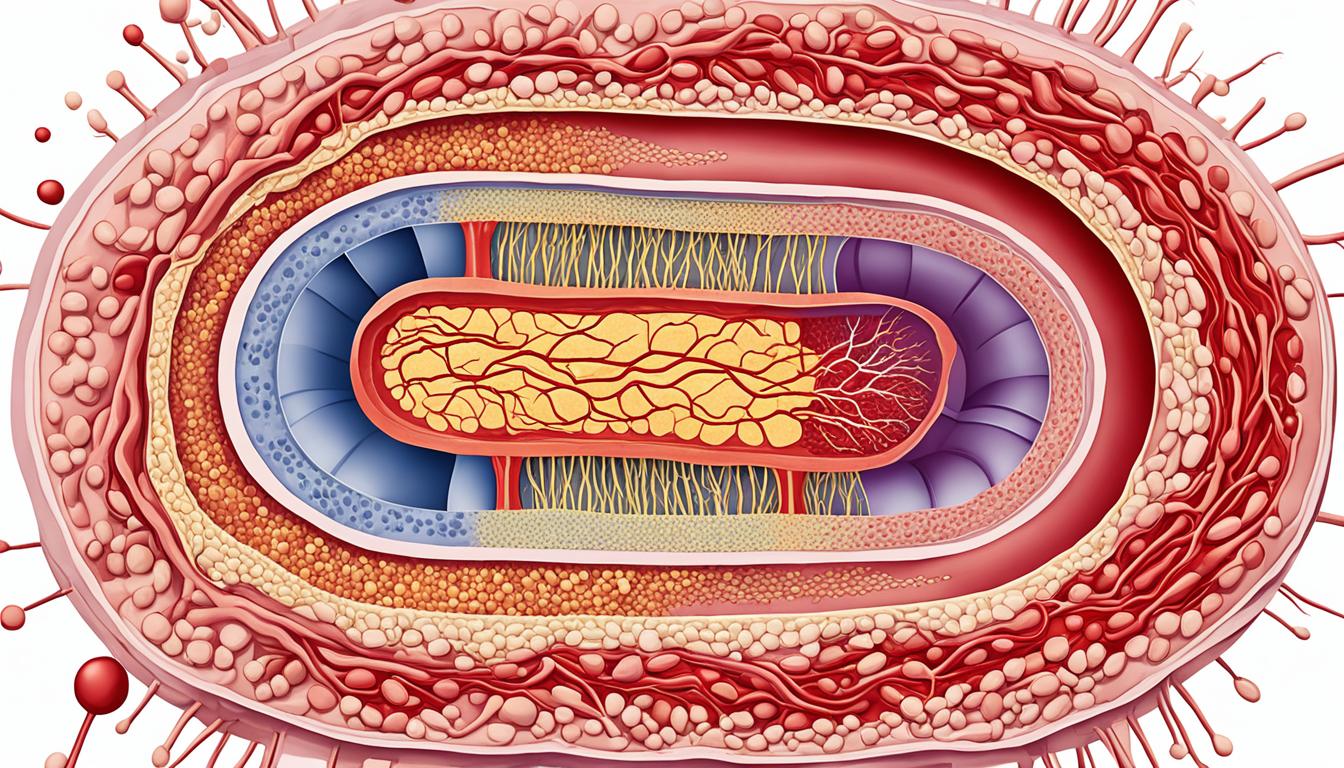High cholesterol, or hyperlipidemia, means you have too much fat in your blood. This can cause big health problems like heart disease if not treated. There are two key cholesterol types: LDL, the ‘bad’ kind, and HDL, the ‘good’ kind.
High LDL can build up in your arteries, leading to heart issues. But, HDL helps keep these levels in check. You can get high cholesterol from genes, poor diet, some medicines, low thyroid, or not being active enough. Catching it early and treating it well are important steps to stay healthy.
Key Takeaways:
- High cholesterol is a common condition characterized by elevated lipid levels in the body.
- LDL cholesterol is known as “bad” cholesterol, while HDL cholesterol is known as “good” cholesterol.
- Elevated LDL cholesterol increases the risk of vascular disease, while HDL cholesterol helps regulate cholesterol levels.
- Factors such as genetics, diet, medications, thyroid problems, and a sedentary lifestyle can contribute to high cholesterol.
- Early diagnosis and effective treatment are essential for managing high cholesterol and reducing the risk of complications.
Symptoms and Diagnosis of High Cholesterol
High cholesterol can greatly affect your health and raise the risk of heart issues. But, it often shows no signs. Because of this, getting your cholesterol checked with a blood test is really important. This helps catch it early.
Even without symptoms, high cholesterol can lead to health problems. This includes chest pain, high blood pressure, and stroke. Some might show yellow skin masses called xanthomas if they’re prone to high cholesterol.
Know that heart disease has signs like chest pain, dizziness, or leg pain. If you feel any of these symptoms, get checked. It’s critical to check your cholesterol levels then.
To diagnose high cholesterol, a doctor will do a blood test. This test checks different types of cholesterol and triglycerides in your blood. Getting tested regularly is advised, especially if you’re at risk due to high blood pressure or obesity. This way, you can catch any issues early and start managing them.
Cholesterol Blood Test: What to Expect
A cholesterol blood test is easy. It just involves taking your blood to check your cholesterol levels. The test looks at:
- Total cholesterol
- Low-density lipoprotein (LDL) cholesterol
- High-density lipoprotein (HDL) cholesterol
- Triglycerides
Test results show your cholesterol breakdown. A doctor looks at this, along with your health and risks, to decide what to do. They might suggest a plan to handle high cholesterol.
Getting regular tests and taking steps to keep your cholesterol in check is vital for a healthy heart.
| High Cholesterol Symptoms | Cholesterol Diagnosis | Cholesterol Blood Test |
|---|---|---|
| Often asymptomatic | Diagnosed through blood test | Measures lipid levels |
| Potential physical manifestations (xanthomas) | Regular screenings recommended | Assesses LDL, HDL, and triglycerides |
| Increased risk of angina, high blood pressure, stroke | Early detection aids in management | Provides comprehensive cholesterol profile |
| Key symptoms: chest pain, dizziness, leg pain | Identifies cholesterol imbalances | Enables tailored treatment strategies |
Treatment Options for High Cholesterol, Including Stem Cell Therapy
The goal in treating high cholesterol is to lower cholesterol levels. Doing this helps lower the risk of heart disease. A key step is changing your lifestyle. This means eating a diet that’s good for your heart. Include plenty of fruits, veggies, whole grains, and lean meats. Don’t forget to stay active and keep your weight in check. This all helps to maintain good cholesterol levels.
Sometimes, your doctor may give you medicine. Statins are a common type. They stop your liver from making too much cholesterol. These drugs are great at lowering ‘bad’ LDL cholesterol. They can also help lower your chance of getting heart disease. Remember, it’s crucial to take your medicine as your doctor tells you.
There are also new treatments becoming available, like stem cell therapy. It’s showing a lot of promise in treating high cholesterol. Stem cells can fix damaged veins and make your heart work better. Research has found they can help with heart failure and other heart problems. How many cells you need and which type you get depend on your health and age. Doctors usually give stem cells through a vein, in a number of sessions, while closely watching you.
It’s really important to talk with your doctor about treating high cholesterol. They can help you figure out the best plan for you. Your doctor will offer tips and advice. They may suggest changes in how you live, prescribe medicine, or even look into new treatments like stem cell therapy. With the right plan and regular check-ups, dealing with high cholesterol is very possible. This way, you lower the chance of having serious heart issues.

